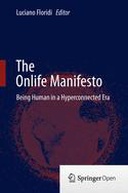Explore

The Onlife Manifesto: Being Human in a Hyperconnected Era
What is the impact of information and communication technologies (ICTs) on the human condition? In order to address this question, in 2012 the European Commission organized a research project entitled The Onlife Initiative: concept reengineering for rethinking societal concerns in the digital transition. This volume collects the work of the Onlife Initiative. It explores how the development and widespread use of ICTs have a radical impact on the human condition.ICTs are not mere tools but rather social forces that are increasingly affecting our self-conception (who we are), our mutual interactions (how we socialise); our conception of reality (our metaphysics); and our interactions with reality (our agency). In each case, ICTs have a huge ethical, legal, and political significance, yet one with which we have begun to come to terms only recently.The impact exercised by ICTs is due to at least four major transformations: the blurring of the distinction between reality and virtuality; the blurring of the distinction between human, machine and nature; the reversal from information scarcity to information abundance; and the shift from the primacy of stand-alone things, properties, and binary relations, to the primacy of interactions, processes and networks.Such transformations are testing the foundations of our conceptual frameworks. Our current conceptual toolbox is no longer fitted to address new ICT-related challenges. This is not only a problem in itself. It is also a risk, because the lack of a clear understanding of our present time may easily lead to negative projections about the future. The goal of The Manifesto, and of the whole book that contextualises, is therefore that of contributing to the update of our philosophy. It is a constructive goal. The book is meant to be a positive contribution to rethinking the philosophy on which policies are built in a hyperconnected world, so that we may have a better chance of understanding our ICT-related problems and solving them satisfactorily.The Manifesto launches an open debate on the impacts of ICTs on public spaces, politics and societal expectations toward policymaking in the Digital Agenda for Europe’s remit. More broadly, it helps start a reflection on the way in which a hyperconnected world calls for rethinking the referential frameworks on which policies are built.
This book is included in DOAB.
Why read this book? Have your say.
You must be logged in to comment.
Rights Information
Are you the author or publisher of this work? If so, you can claim it as yours by registering as an Unglue.it rights holder.Downloads
- 112 - pdf (CC BY-NC) at OAPEN Library.
- 169 - mobi (CC BY-NC) at Unglue.it.
- 147 - pdf (CC BY-NC) at Unglue.it.
- 237 - epub (CC BY-NC) at Unglue.it.
Keywords
- Media Sociology
- R & D/Technology Policy
- Biochemical engineering
- Business & management
- Business communication & presentation
- complexity, responsibility and governance
- Digital revolution
- Economics, finance, business & management
- Human condition
- hyperconnected
- Industry & industrial studies
- information revolution
- Information society
- infosphere
- Manufacturing industries
- Media Sociology
- media usage and the future of democracy
- Pharmaceutical industries
- Philosophy of Technology
- R & D/Technology Policy
- Technology, engineering, agriculture
- The Onlife Initiative
- the public sphere in a computational era
- thema EDItEUR::K Economics, Finance, Business and Management::KJ Business and Management::KJP Business communication and presentation
- thema EDItEUR::K Economics, Finance, Business and Management::KN Industry and industrial studies::KND Manufacturing industries
Links
DOI: 10.1007/978-3-319-04093-6web: https://link.springer.com/book/10.1007/978-3-319-04093-6
Editions


